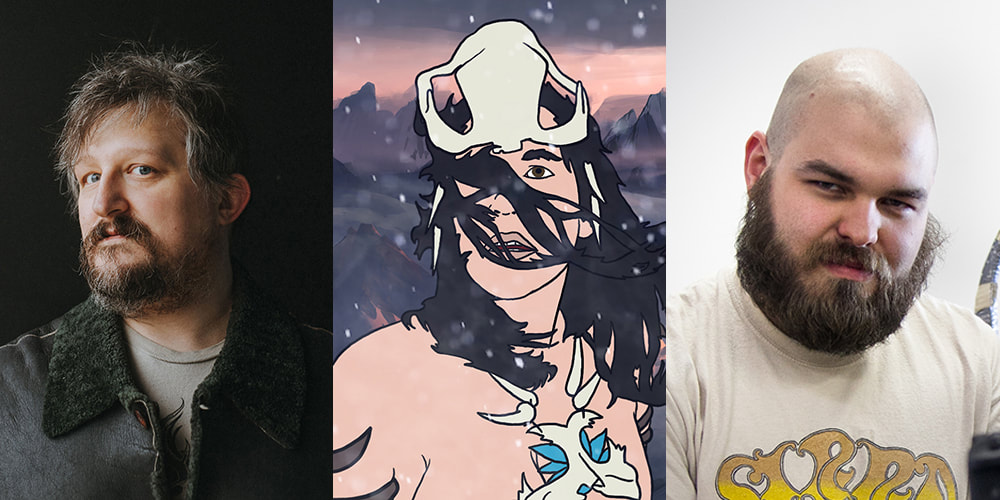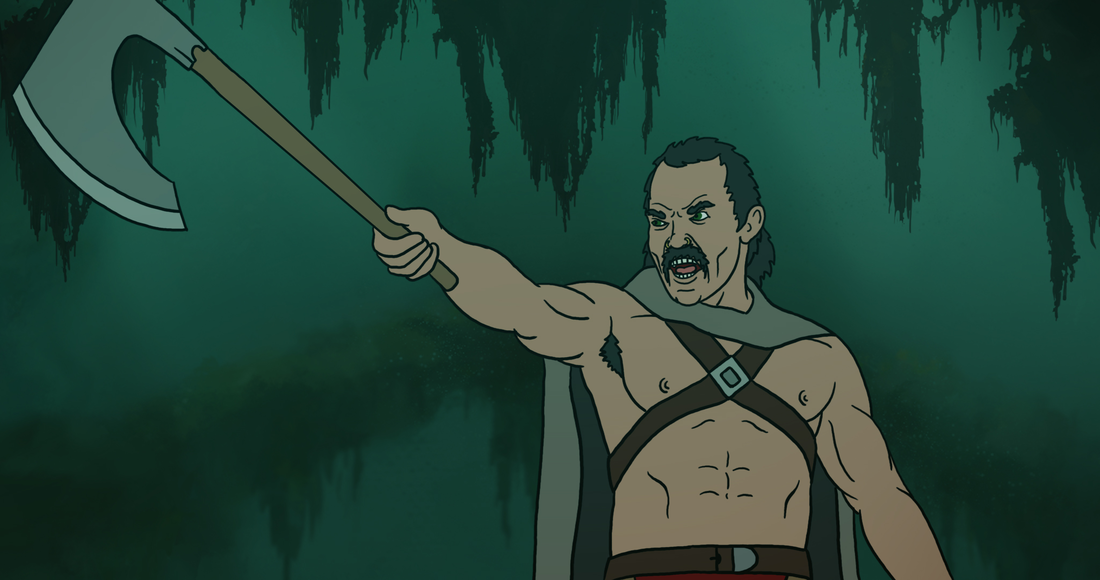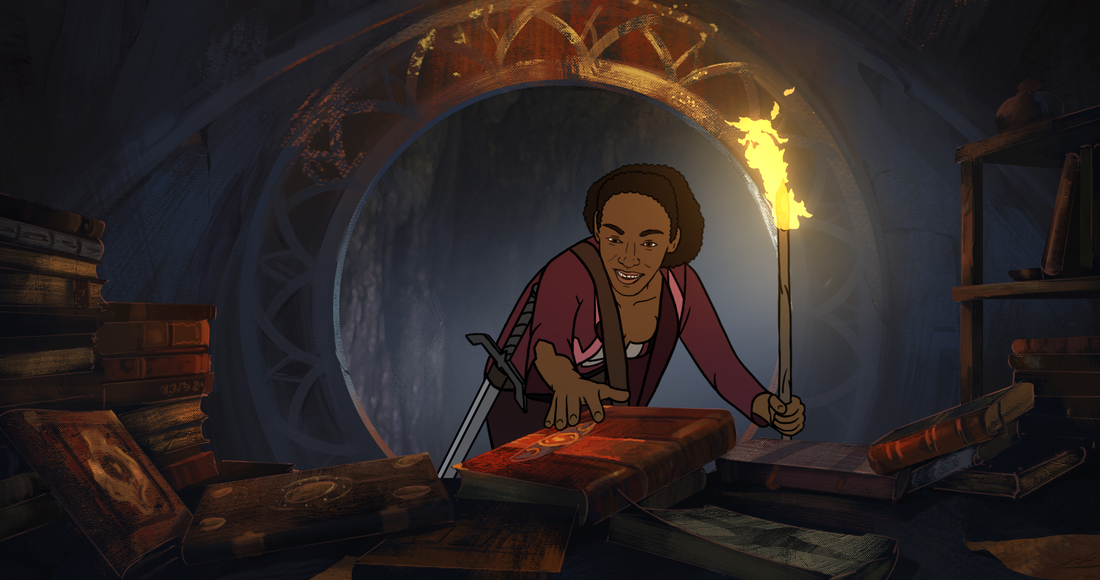|
Interview by Sean Boelman
One of the highlights of this year’s Midnighters section at the virtual SXSW Film Festival is The Spine of Night, an ultra-violent adult animated fantasy epic featuring a star-studded voice cast. We at disappointment media got the opportunity to chat with Morgan Galen King and Philip Gelatt, the directorial duo behind the film, about their process of bringing their vision to life. Check out the interview below!
On Animating the Film
disappointment media: I think one of the things that really stands out to me about this film is that it's really epic in scale, but it's an independent film. And so what were the difficulties of making something this ambitious on a smaller scale?
Philip Gelatt: Yeah, I mean, so one thing to acknowledge about that, off the bat is that what allowed us to do this independently is basically the sheer amount of time that it took our animation team led by Morgan to do the animation. Like it took about seven years, to be honest, from when we started to when we finished. So, you know, and we knew that going in, you know, we knew that we were setting out to make something epic in scale and vastly ambitious on a visual level and a narrative level. And just sort of knew, I think, and I think we probably verbalized it, but I think we all sort of knew on sort of like an internal subconscious level that the way it was probably going to get done was brute force. And so that's sort of, you know, how it happened. Yeah, I mean, I don't know if I have anything else to say on that, other than just like that sort of the like, what it takes to do something like this independently is just a lot of grit, I guess. Morgan Galen King: I mean, I think it was, you know, it was definitely an act of endurance. You know, I remember when we were finished shooting the motion reference in 2014, March 2014. You know, like I was, I think we were driving to the train station, so I could go back to Philadelphia to start the animating. And I was like, "Well, I sure hope we can be, you know, I think three, maybe four years." But as it gets into year five, and year six, like we are, we are really in this now. And when we're tipping into the latter half of the decade of production. So it was, yeah, I mean, for sure. Brute force is the answer to pulling that off, I think. disappointment: And so did you have any particular scenes or images that were your favorite to animate, or that were the most memorable to animate? King: Well, I think anyone who has ever gotten a chance to animate a lot of ultraviolent gore, it just tickles me, I mean, I'd like to think the film treats the gore in a fairly serious manner. But as an animator, keeping track of like, the weight of organs and the spatter of blood, and all of that is just like,it feels like a juggling act, it's a very active animation when you're working with that much fluid. It's always the most fun to draw. Gelatt: I thought you were gonna say one of the scenes of just endless people talking to each other, like scene 11 is the scene in the throne room, and it's the longest scene in the movie, and it took Morgan and the other animators forever to do. That's like a negative thing to think back on. Not the positive thing of the gore. Yeah. On the Film's World
disappointment: And so another thing that really impressed me about the film is just the level of detail that you put into the world building, both in the writing and the animation. What informed your process of writing and animating the world of The Spine of Night?
King: I mean, Phil, you're saying, we were talking earlier about, like, how much coding influenced the psyche? Do you want to talk to touch on it? Gelatt: Sure. I mean, from a writing perspective, you know, the chance to build a fantasy world is so much fun. Like, it's so much fun, but it's also there's a lot of responsibility, right? Because you want the viewers to, you know, you're bringing them someplace strange, and you're asking them to engage with it, visually, and also emotionally. And then also, like, intellectually. You're asking a lot of the viewer, so when you set out to write something like that, you know, you want to be detail oriented, but you can't be too detail oriented, there's this whole balancing act that you have to do. So when we set out to do it, you know, I think we had in mind, like our favorite examples of the genre. And like, for me my favorite example is the 1982 Conan movie, because it is, like, it just just feels like a tangible world that has like a real history and like, the armor looks like it comes from different cultures. And it's just like, I just love it. So I don't know if you can really see that in this movie. But it certainly was massively influential, at least in terms of, I think both the writing and the visualization of the movie, in terms of, you know, how you go about making a grounded low fantasy, feature film. Because we're not doing dragons and elves, and you know, like, there's no minute tear off, there's like, it's a very different flavor of fantasy than that Tolkien stuff. So you have to be a little bit more focused on the, you know, the tangible aspect of it, I guess. Not to not to insult Tolkien, but you know. King: I think that's pretty much right on point. I mean, like in terms of creating a detailed world that feels fleshed out, I mean, there's obviously some fantasy genre tropes in there, I think. But like, we wanted to really sort of push off a lot of them. And I think, like Phil was saying, like, to go to, like, lower fantasy, like Conan, that is less about like fantasy races, but also to not really do like, Game of Thrones, you need a family tree guide to follow the lineages of what's happening. I think, you know, I think we're sort of trying to find an area that was not like either of those. disappointment: I think you also leave a lot of room to be explored. Are there any more stories you want to tell in this universe? King: I mean, I think we certainly have considered it. Like we've talked about, you know, a lot of ideas over the years. Over the course of seven years of working on this, I think we've kicked around ways we could do all sorts of things with it, because it does sort of, I mean, act as a hub through the middle of a bunch of different timelines. So like, if people really wanted to, I think we could tell all sorts of stories that interconnect and spill out of this setting. For sure. Gelatt: It's a tricky question. Like, as Morgan says, We've certainly discussed it. Both sequel ideas and spin-off ideas. I think there's also part of the fabric and the DNA of writing the movie and making the movie was the hope that people would imagine some of those stories themselves, right? Like we sort of left a lot of these dangling narrative bits and like, dangling characters almost. And the hope with all of them wasn't like, "Oh, we could do a show about this, or we could do a show about that". The hope for the viewer to lean in and put themselves in the world and imagine the other stories that could exist there. Like, that's always sort of been my favorite thing about fantasy fiction is both the story, but then also the details of the story leaves out that let me fill in myself. Which isn't to say we don't have stories we want to tell this to say we wouldn't. Like we're saying, I don't think it's the type of fantasy world that we would want to go through and make an appendix and a huge family tree about. That wasn't the style we were after, as he said. disappointment: Did you have one of the heroes in the film that was your favorite? King: I love them all so much. even the ones that are kind of jerks, I like all of them. Well, I mean, Mongrel, the Barbarian character that Joe Manganiello voices is a character that I've sort of been doing things with on and off for over a decade now. In like, sketching stuff, so I mean, I've always loved that character. I just think he's like a fun distillation of like, it's Conan but the mustache, he's a eunuch. He sort of wears like a He-Man thing, he's like a meta-barbarian to me. Gelatt: Mongrel the meta-barbarian. It's great. Yeah, it's a spinoff series right there. For me, I mean, I also love them all. Faye, the scholar in the second sequence I think, is always going to be my favorite. Because, like, Mongrel is a meta-barbarian. Faye to me is like a fantasy version of Indiana Jones, right? Like she's like, she's like what if Indiana Jones were in Conan the Barbarian? And that's just like a really exciting idea to me. And Benny Gabriel who voices her and who was the live action reference for her, I just think she's so massively talented. So there's like, affection there, both for the behind the scenes stuff, and also for the character itself. disappointment: And you mentioned the cast, you guys assembled an amazing voice cast for this film, what was it like signing them on to this project, and then working with them? Gelatt: Signing them on to it was exciting and terrifying. Like in that, terrifying, because you know, you want to get a large voice cast, and then they say yes and you're like, "Oh, my God, now I have to go record with Patton Oswalt," Then you're like, "This is maybe gonna be weird," but then it's not weird. It's great. So it's fun. And we tried to pick, tried to approach people who we thought would appreciate, you know, what the movie is. And I think we did find that. So yeah, I mean, it was a lot of fun. I mean, they're a great cast, and they're a great group of people, and they all seem to really like, get it, which is nice. Like, it's nice to like, you know, have them sort of engaged with it for what it is. King: Yeah, I'd say two things. I mean, it's great. The final voice cast is just a dream come true in a lot of ways. I mean, when you get to tell someone "Oh, yeah. Also, Lucy Lawless is in this movie.," and, "Oh my God, Xena is in this movie." It's I mean, that's tremendous. But as Phil was saying earlier about Betty Gabriel too, this has been such a fun process in that she was there when we were shooting the motion reference, because we actually filmed so long ago that we were filming before Get Out, which is sort of her big breakout role. And so, you know, it's been fun too to have her be able to be a part of the cast as the years have gone. On the Rotoscope Animation Medium
disappointment: So what about this process of rotoscope animation really stands out to you?
King: I mean, I grew up with a lot of these films that we're referencing like the Ralph Bakshi films. From a very young age, I was in love with us. Although it the style was never as big in the West, like, you know, Eastern European animation has such a rich history of it in a way that it never quite, I think the Disney cartooning approach was so popular in America that like a lot of this stuff done under the Soviet regime never made it over. But there was so much rotoscoping outside of that Western animation world and I love all that stuff, too. I think there's just a realism to it that I think for some people I've heard say tips into the uncanny valley, but I feel like when it's done well, at least, I think it sort of skirts around that into being its own aesthetic choice. Gelatt: Yeah, it's like a very distinct flavor of animation that is increasingly rare, but I think it's just a particular flavor that I think is great. disappointment: And so what do you think is the potential of the animation medium for stories like this that are grand, but to produce them live action would cost hundreds of millions of dollars? But you have this independent film that's just as impressive on a smaller budget? King: Oh, I mean, I hope so. We certainly tried. I mean, I think we're really swinging for the fences. I think animation is, you know, like, so inherently geared towards this, you know, like, creating fantastical stuff. I think having done more like, you know, we animated shots of people just talking over drinks in a bar. And like, animation doesn't necessarily always serve that. So I think it really motivated us to keep the scenes full of fantastical ideas on a regular clip in a way that live action can kind of breathe more. And little nuances can tell a lot more in a live action thing, and in an animated forum, it's almost like, you're encouraged to make it epic and fantastical. Because it's well, it's just a lot more fun to draw and it utilizes the medium better.
The Spine of Night is screening as a part of the online edition of the 2021 SXSW Film Festival, which runs March 16-20, 2021.
0 Comments
Leave a Reply. |
Archives
March 2024
Authors
All
|
|
|
disappointment media
Dedicated to unique and diverse perspectives on cinema! |



